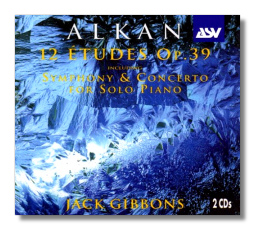
The Internet's Premier Classical Music Source
Related Links
- Alkan Reviews
- Latest Reviews
- More Reviews
-
By Composer
-
Collections
DVD & Blu-ray
Books
Concert Reviews
Articles/Interviews
Software
Audio
Search Amazon
Recommended Links
Site News
 CD Review
CD Review
Charles-Valentin Alkan

Twelve Studies in the Minor Keys, Op. 39
- Etüde, Op. 39 #1 "Comme le vent"
- Etüde, Op. 39 #2 "En rythme molossique"
- Etüde, Op. 39 #3 "Scherzo diabolico"
- Etüdes, Op. 39 #4-7 "Sinfonie"
- Etüdes, Op. 39 #8-10 "Konzert für Klavier solo"
- Etüde, Op. 39 #11 "Ouvertüre"
- Etüde, Op. 39 #12 "Le festin d'ésope"
- Chant, Op. 38 #1
- Chant, Op. 65 #6 "Barcarolle"
- Esquisse, Op. 63 #2 "Le staccatissimo"
- Esquisse, Op. 63 #4 "Les cloches"
- Esquisse, Op. 63 #11 "Les soupirs"
- Esquisse, Op. 63 #48 "En songe"
- Etüde, Op. 35 #5 "Allegro barbaro"
- Les Mois, Op. 74 #1,2
- Nocturne #1, Op. 22
- Prélude, Op. 31 #8 "La chanson de la folle au bord de la mer"
- Prélude, Op. 31 #12 "Le temps qui n'est plus"
- Prélude, Op. 31 #13 "J'étais endormie, mais non coeur veillait"
Jack Gibbons, piano
Academy Sound & Vision CDDCS227 2CDs 155:00
The young British pianist Jack Gibbons first came to my attention via three discs of his own Gershwin recreations and transcriptions. None of these, however, prepared me for his protean way with Charles-Valentin Alkan, the reclusive, misanthropic Romantic composer whose prolific and prolix output holds many attractions and challenges for fearless super-virtuoso types. Gibbon's has just recorded all twelve of Alkan's Studies in the Minor Keys Op. 39, a gargantuan, two-hour-plus cycle that embodies a symphony (Études 4-7) and concerto (Études 8-10) for solo piano, an overture (#11), and a riotous set of twenty five variations depicting the various animals in Aesop's fables (#12-Le festin d'Esope).
Given the music's relative obscurity, it took the pioneering recordings of Ronald Smith and the late Raymond Lewenthal to establish a performing tradition virtually from scratch. Lewenthal's flamboyant, orchestral approach brought out the Dionysiac qualities in the writing, in contrast to Smith's Apollonian restraint and refinement. While Gibbons duly acknowledges his debt to Smith's interpretation, he has clearly grabbed Lewenthal's mantle and run away with it, boasting a more colorful sonority and flexible technique than the late American Alkan specialist. Gibbons plunges head first into the treacherous writing with dashing brio and a titanic, exuberant sense of flow. Even when Gibbons' formidable fingers are pushed to their limits, such as the repeated notes in the Concerto's first movement, nothing ever sounds forced.
Among available recordings, I find Marc-André Hamelin's Concerto (Music and Art) unmatched in terms of pianistic proficiency and truly unflagging rhythm - Gibbons' slightly looser-limbed playing tends to let the chips fall where they may. And yet Gibbons rougher demeanor and sheer spontaneity seem more in tune with the quintessential Alkan. His playing is constantly vibrant and alive, and communicates a physical joy in his instrument one rarely experiences with modern recordings. These generously filled discs constitute a major release, and should be heard by anyone with the slightest interest in this most intriguing of all neglected nineteenth century figures.
Copyright © 1996, Jed Distler




















